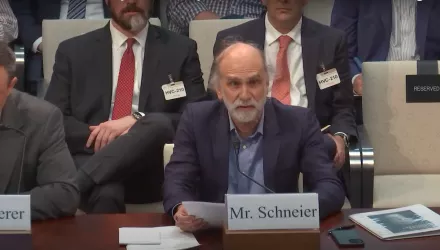
In May of 2022, Lauren Zabierek, Executive Director of the Cyber Project at the Harvard Kennedy School’s Belfer Center, and Sean Plankey, former Principal Deputy Assistant Secretary in the Office of Cybersecurity, Energy Security, and Emergency Response at Department of Energy, delivered a talk entitled, We Must Regulate Water and Wastewater Cybersecurity--Here's How, at Hack the Capitol 5.0. The talk was a small discussion during the day-long, multi-track event designed to educate congressional staffers, scholars, and the press on some of the most critical cybersecurity challenges facing our nation today.
Based on the article by Lauren and Belfer Cyber Project nonresident fellow, Selena Larson, this talk expanded on the concept from specifically the water and wastewater sector to encompass critical infrastructure more broadly. These recommendations (including specific water recommendations in the paper) are offered in the following categories:
Cybersecurity Legislation |
Continuity of Economy |
Water and Wastewater, Specifically |
|---|---|---|
|
Pass mandatory cybersecurity regulations legislation for Critical Infrastructure:
Set requirements for cyber disruption and disaster mitigation and response. Authorize CISA as the standard maker for cybersecurity definitions, and allow the agency to update the definitions as the threat landscape & business models evolve. |
Reframe the focus on “left and right of boom” planning. We live in an age of constant disaster
Move Incident Response Mainstream:
Build Resiliency through Continuity of the Economy Planning
A plan must involve the states and their homeland security and emergency management offices in coordination with the federal Department of Homeland Security. It must also involve funding, regular exercise at a regional and national level, and collection of lessons learned. |
Appropriate state and local grant program for a cybersecurity “standard of care” with municipal utilities to include breach notification and mutual aid amongst providers. Model after the CIP framework, incorporate cybersecurity rules into the Environmental Protection Agency (EPA) Sanitary Surveys. Add Cybersecurity of information and operational technology to the eight focus areas covered by the EPA Sanitary Survey. Create North American standards for OT sensors and actuators. Require engineering firms to incorporate cybersecurity into their device engineering design and require acceptance and testing. Require detection and response plans aligned with NIST Cybersecurity Framework and coordinated with the relevant SRMA for all Critical Infrastructure. Codify Water ISAC list of cybersecurity fundamentals into regulatory requirements for all water and wastewater facilities Address specific regulations based on common cyberattack behaviors such as:
|
Zabierek, Lauren and Sean Plankey. “Clear, Actionable Ways to Enhance Cybersecurity in the Water Sector.” Belfer Center for Science and International Affairs, Harvard Kennedy School, June 7, 2022








